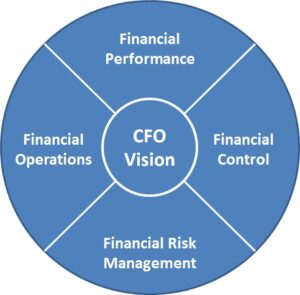The Chief Financial Officer (CFO) role in a business can be considered as the person responsible for keeping the financial pulse of your the company flowing in a healthy way. Money in, money out, projected profits, future financial planning, tax ramifications and much more all encompass the financial requirements of any business. There is so much to do…but who is keeping proper track of your company finances?
Companies often get caught in the mire of daily operations and forget what an integral role the CFO can play, particularly in relation to all the financial inner-workings of your business.
Perhaps you already have a CFO, or maybe you, as the business owner, are just wearing that hat yourself because you lack a better option. In order for you to gain a better understanding of the CFO role, let’s take a look at the various areas typically covered by that key position in your company management.
As part controller, part treasure and part strategist, the CFO has changed dramatically in  recent years, particularly with the advancement of web-based tracking solutions and software. Now, every manager and leader in a company who should have access to key information in an organization can do so in a more interconnected manner. Therefore, the CFO role has evolved somewhat, into a much more leadership-oriented strategic position.
recent years, particularly with the advancement of web-based tracking solutions and software. Now, every manager and leader in a company who should have access to key information in an organization can do so in a more interconnected manner. Therefore, the CFO role has evolved somewhat, into a much more leadership-oriented strategic position.
Here are just a few examples of the roles the CFO typically covers::
- Establishing key financial objectives and policies for the company
- Developing and implementing strategic business and operational plans, projects, programs and systems.
- Analyzing cash flow, cost controls, and expenses to determine weak spots and guide senior management to better decision-making.
- Preparation of all financial reports, including P&L and balance sheets, KPI reports, shareholders statements and reports for government regulatory agencies.
- Oversight and approval of expenditures, position control documents, department budgets and mass salary updates.
- Tax planning and overseeing preparation and timely filing of returns.
- Ensuring compliance with local, state, and federal reporting requirements.
- Managing banking relations and capital raising activities for expansion and growth.
- Overseeing accounting department staff, including meeting with department heads to offer guidance and direction.
- Monitor long-range economic trends and projects company prospects for future growth in overall sales and market share, as well as opportunities for acquisitions or expansion.
The CFO role can be varied and complex, but one thing is certain: Having the right person established in that role, whether it is an internal position or an outsourced interim CFO, can make or break a company. The difference between a well-qualified and visionary CFO and someone who just “plays the role” can mean substantial profits (or losses) that go straight to your bottom line.

